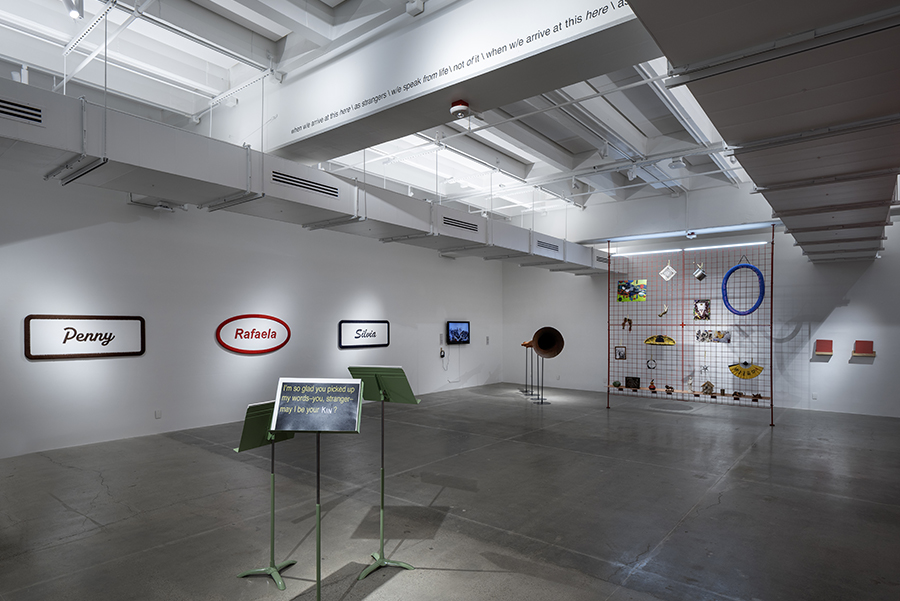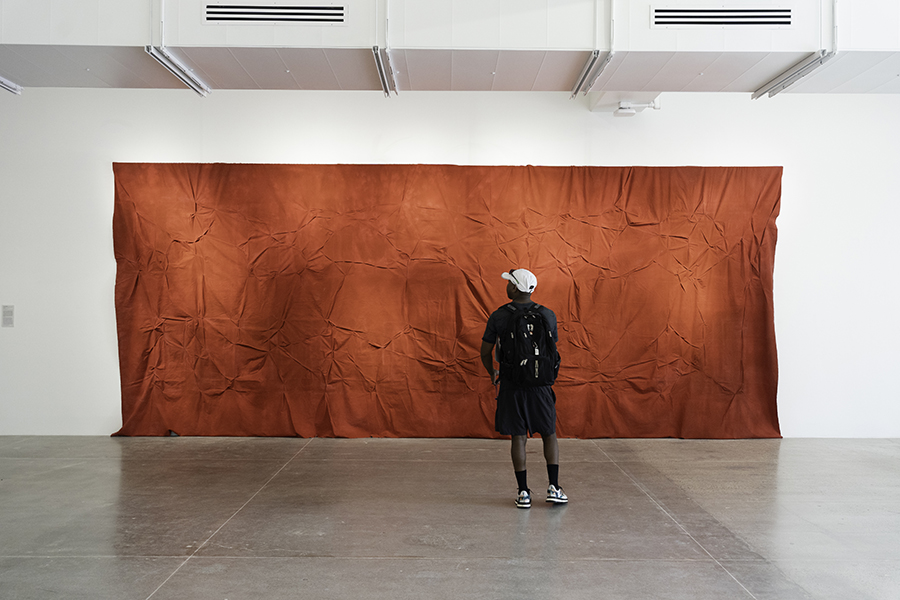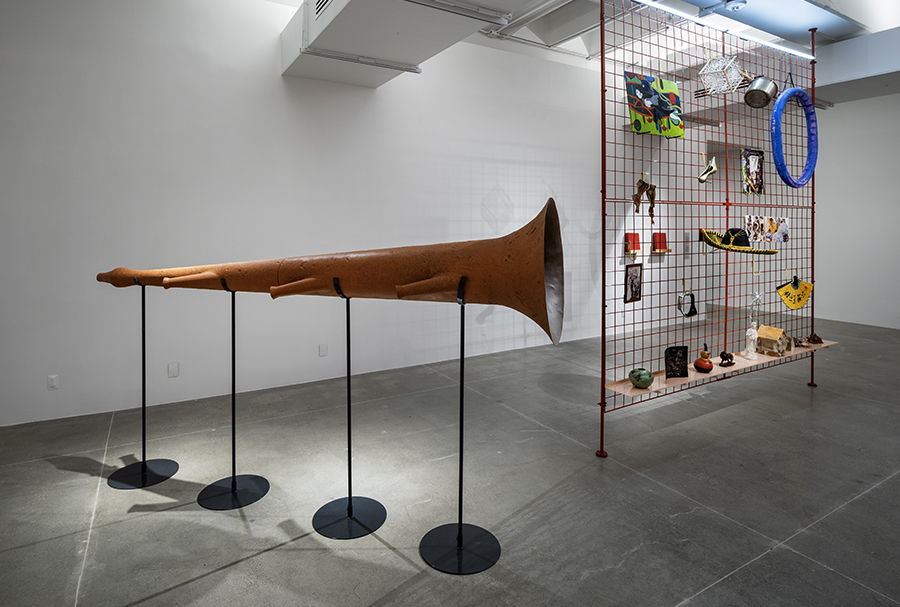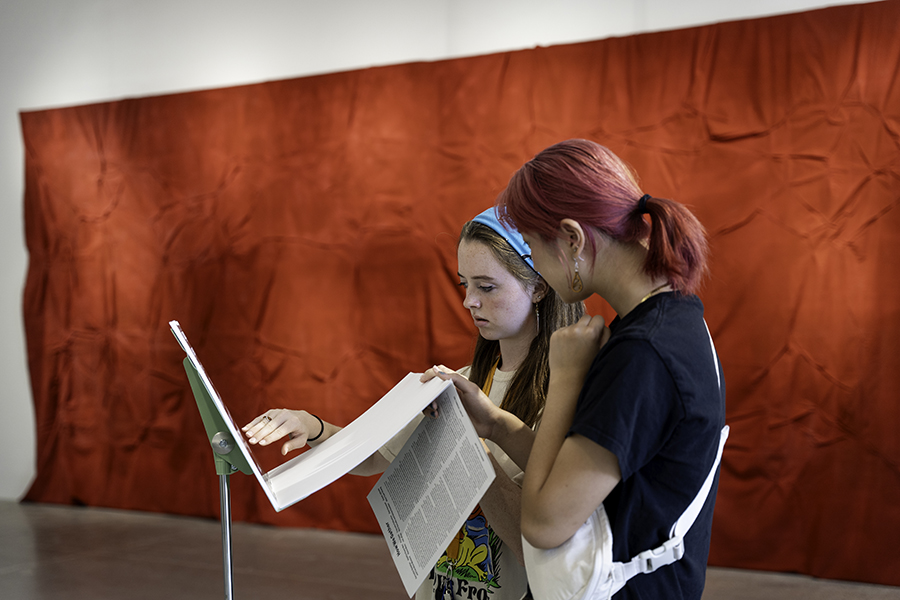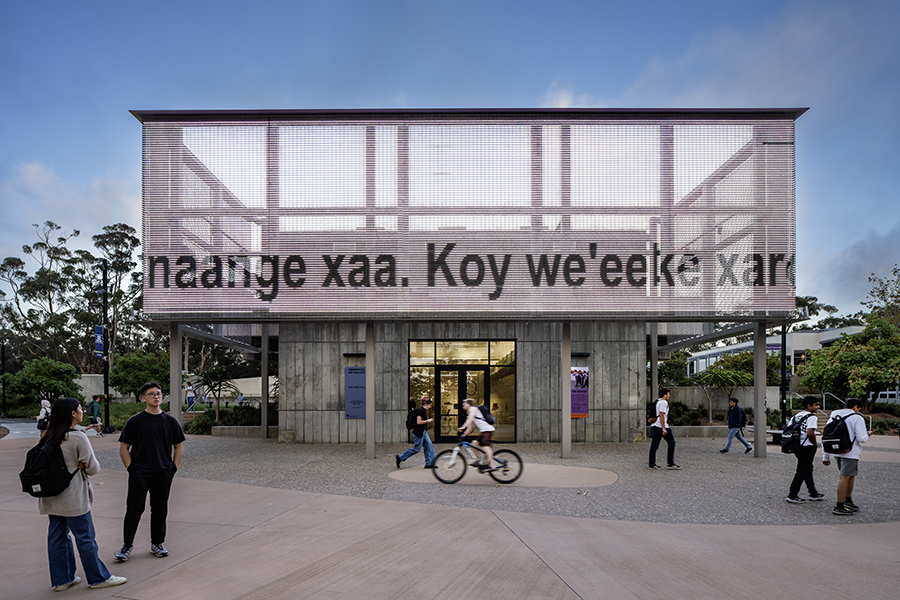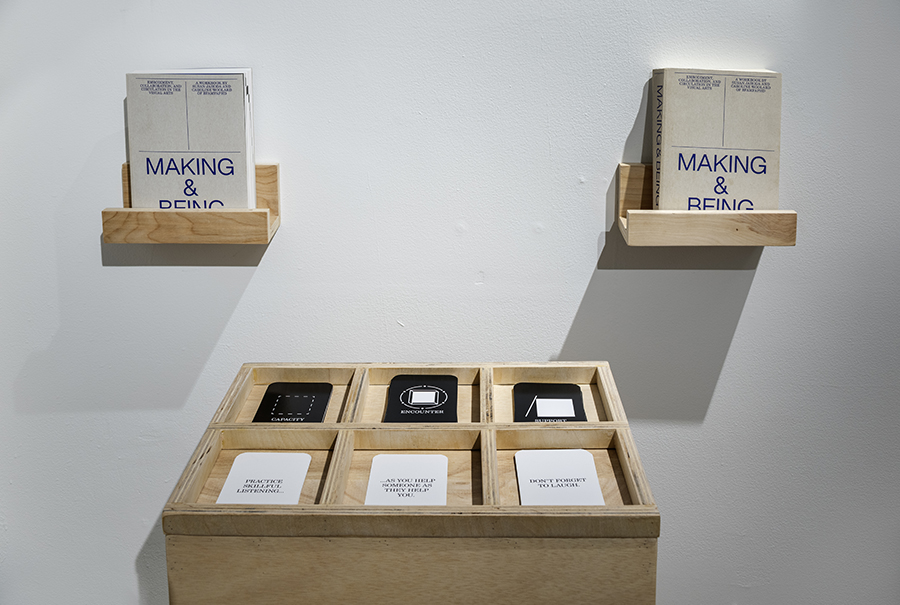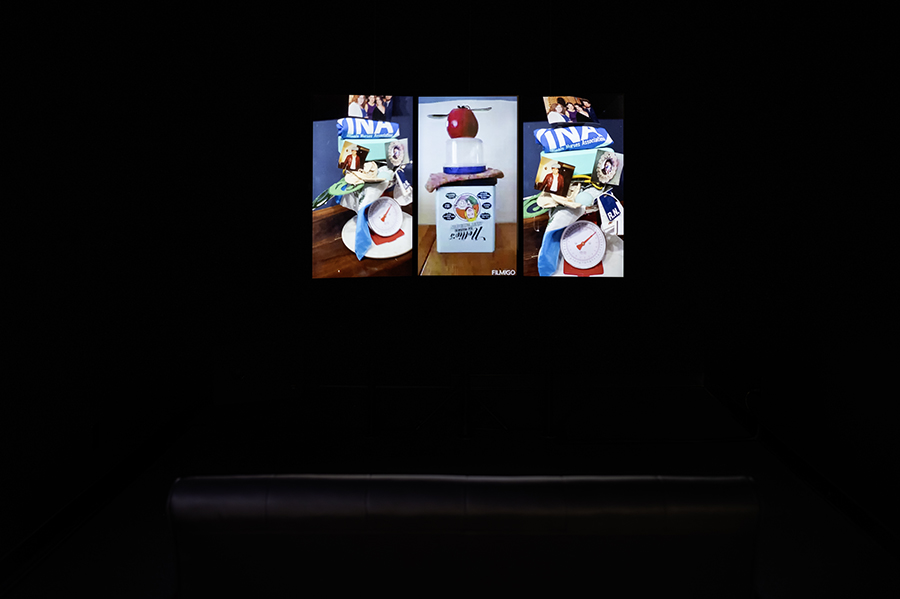How We Gather
October 7-December 9, 2023
The group exhibition How We Gather investigates the notion and enactment of solidarity across various contemporary artists’ practices through the lens of the pandemic. The state of emergency brought on by COVID-19 both magnified existing structures of precarity and inequity, while also strengthening social bonds. In the words of writer, activist, and artist Johanna Hedva, as a society we witnessed “what happens when care insists on itself, when the care of others becomes mandatory, when it takes up space and money and labor and energy.” The failures, shocks, and losses brought on by the pandemic revealed a deficit of care in numerous realms, inspiring many artists, activists, and theorists to reevaluate how their work can generate a greater responsibility to a collective body—a stronger sense of unity, collaboration, and mutuality. From conversations on “solidarity economics” to attempts to build “solidarity infrastructures,” this exhibition takes stock of what solidarity in the arts means today.
Participating Artists:
Zarouhie Abdalian, Adelita Husni-Bey, Pia Camil, Cog•nate Collective, Kimi Hanauer, Susan Jahoda and Caroline Woolard, Elana Mann, noé olivas, Nina Sarnelle and Selwa Sweidan, Alice Yuan Zhang
Curated by Ceci Moss, Director and Chief Curator of the Mandeville Art Gallery and Professor of Practice, Visual Arts
[Images: Installation view, How We Gather, Mandeville Art Gallery, October 7-December 9, 2024. Photo: Pablo Mason and Millie Root]
Public Programs
All events are free and take place in person at the Mandeville Art Gallery, unless indicated otherwise.
Saturday, October 7, 2023, 2–6 pm
Opening celebration
Featuring a new commission by Elana Mann and Sharon Chohi Kim, performed by the San Diego New Verbal Workshop
Saturday, October 14, 2023, 2–4 pm
“And will be again…” Roundtable Conversation
Led by exhibiting artists Cog•nate Collective with Dr. Wayne Yang (UC San Diego professor and John Muir College provost) and Dina Gilio Whitaker (Colville Confederated Tribes descendant, scholar, educator, journalist and author in American Indian studies), this program expands on the underlying themes/aims of the artists’ new commission for the exterior screen of the Mandeville Art Gallery “And will be again…”.
Following a screening of Cog•nate Collective video work "Circumlocution: Border / Circunlocución: Frontera”, the conversation will address polemics and debates in relation to constructions of indigeneity, translation, and what it means to be accomplices in materializing visions of indigenous futurity – all while living in the shadow of the U.S./Mexico border. Inspired by Dr. Wayne Yang and Dr. Eve Tuck’s celebrated essay “Decolonization is not a metaphor,” this event will reflect on what solidarity with decolonial projects might look like in the local San Diego/Tijuana region.
Saturday, October 21, 2023, 2–4 pm
“A woven word web of our own / AWWWOOO,” a workshop led by Alice Yuan Zhang
How might it feel to be in a digital network together, but outside the fraught domains of Big Tech? What stories would we tell one another if we could store them on our own terms? This workshop explores the intimate canvas of a local network through a joint exercise in creative writing and server hosting. Learn to make a web page, use the terminal, write with others, and weave a networked narrative. Participants will become familiar with the basic components of networking by making and feeling a web that is literally there in the room. It’s an accessible and intimate approach that aspires to open up critical questions regarding data governance, decentralization, digital commons, safety, and energy use, and empower participants to experiment with further acts of digital solidarity.
Participants are invited to bring their own laptops. No prior coding experience is necessary.
Saturday, November 4, 2023, 2–4 pm ONLINE
“Scaffolding Autonomies: Scores for Daily Rehearsal,” an online workshop led by Kimi Hanauer of the Center for Liberatory Practice and Poetry
Participants chronicle and rehearse practices for collective care and solidarity that emerge from everyday encounters. Through an exploration of artworks, poetry, theory, and political projects, they create a shared collection of scores for daily rehearsal that move us toward a horizon of autonomy and collective self-determination. Grounded in the framework of mutual aid, this workshop explores practices of collective care that sustain social movements and encourage daily bodily motion, experience, and presence.
Saturday, November 11, 2–4 pm
“Touch Praxis,” a workshop led by Nina Sarnelle and Selwa Sweidan
Collaborators Nina Sarnelle and Selwa Sweidan lead this workshop exploring touch as a time-based medium and a system of co-creating knowledge. Participants will be led through somatic exercises, and have the option to engage in solo or small-group touch experiments. No previous experience required.
Tuesday, November 28th, 6:30pm
Location: SME (Structural & Materials Engineering Building) 149
Artist Talk by noé olivas
Organized as part of the Department of Visual Arts’ Guest Lecture Series
Monthly Lunchtime Exchange & Curator-Led Tours
On the designated days listed below, curator Dr. Ceci Moss leads a free tour of the exhibition How We Gather followed by an invitation to exchange objects via Pia Camil’s A Pot for a Latch. Visitors are asked to bring items with personal value and history to trade.
Thursday, October 26, 12:30–1:30 pm
Thursday, November 16, 12:30–1:30 pm
Thursday, December 7, 12:30–1:30 pm
Note: Prohibited exchange items include but are not limited to electronics, items over twenty pounds, objects less than six inches in diameter, food or other perishables, and any hazardous materials. Encouraged items include but are not limited to artworks, colorful domestic objects, photographs, clothing, and personal trinkets. Objects accepted for exchange will not be returned to the submitting party.
Resources
On Screen: Cog•nate Collective "And will be again..." (2023)
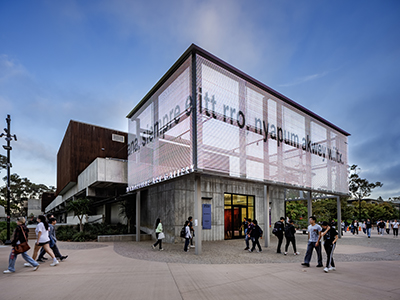 Cog•nate Collective (Amy Sanchez Arteaga and Misael Diaz)
Cog•nate Collective (Amy Sanchez Arteaga and Misael Diaz)
And will be again…, 2023
Digital video, 7 min.
Courtesy the artists
And will be again… is a site-specific commission created for the Mandeville Art Gallery’s exterior screen. Initiated during the height of the pandemic, the project attends to the complexity of establishing cross-cultural decolonization within the diverse border community of Tijuana/San Diego. It illustrates “incommensurability,” as opposed to commonality, as an opportunity for solidarity across groups. The text in the looped video is a poem by Gloria Anzaldúa, author of Borderlands, which reads:
This land was Mexican once,
was Indian always
and is.
And will be again.
With the help of Indigenous scholars and allies, the artists translated and retranslated Anzaldúa’s poem from the colonizing languages of the Tijuana/San Diego region (English and Spanish) into the many Indigenous languages spoken here among Native and migrant communities from southern Mexico and Guatemala: Kumeyaay, Tongva, Mixteco, Zapoteco, and Kaqchikel. The resulting slippages speak to “incommensurate” understandings of land, identity, and ownership, and treat them as starting points for unity.
Cog•nate Collective (Amy Sanchez Arteaga y Misael Diaz)
And will be again… (Y será de nuevo…), 2023
Video digital, 7 min.
Cortesía de los artistas
And will be again… (Y será de nuevo…) es una obra por encargo de sitio específico creada para la pantalla exterior de la Mandeville Art Gallery. El proyecto, que inició en el momento más álgido de la pandemia, trata acerca de la complejidad para establecer una descolonización intercultural dentro de las distintas comunidades de la frontera entre Tijuana y San Diego. Ilustra la “inconmensurabilidad”, opuesta a lo que hay en común, como una oportunidad para la solidaridad entre los grupos. El texto en el video que se repite es un poema de Gloria Anzaldúa, autora de Borderlands, que dice:
This land was Mexican once,
was Indian always
and is.
And will be again.
Esta tierra alguna vez fue mexicana,
siempre fue Indígena
y es.
Y será de nuevo.
Con la ayuda de académicos indígenas y aliados, los artistas tradujeron y volvieron a traducir el poema de Anzaldúa de las lenguas colonizadoras de la región de Tijuana y San Diego (inglés y español) a varias lenguas indígenas que se hablan dentro de las comunidades nativas y migrantes del sur de México y de Guatemala: Kumeyaay, Tongva, Mixteco, Zapoteco y Kaqchikel. Los desfases resultantes hablan de la comprensión “inconmensurable” de la tierra, de la identidad y de la propiedad, y se acerca a ellas como si fueran los puntos de inicio hacia la unidad.
Leer en español
How We Gather
Cómo nos juntamos
7 de octubre–9 de diciembre, 2023
La exposición grupal How We Gather (Cómo nos juntamos) investiga la idea y la representación de la solidaridad integrada en la práctica de varios artistas contemporáneos por medio de una mirada de la pandemia. El estado de emergencia que provocó el COVID-19 al mismo tiempo amplió las estructuras existentes de precariedad y desigualdad, y reforzó los lazos sociales. En palabras de la escritora, activista y artista Johanna Hedva, como sociedad fuimos testigos de “lo que sucede cuando el cuidado insiste en sí mismo, cuando el cuidado hacia los demás se vuelve obligatorio, cuando ocupa el espacio y el dinero y la labor y la energía.” Los fracasos, las conmociones y las pérdidas que trajo la pandemia revelaron un déficit en el cuidado, inspirando a muchos artistas, activistas y teóricos a reevaluar cómo su trabajo puede generar más responsabilidad hacia un cuerpo colectivo— una sensación más fuerte de unidad, de colaboración y de reciprocidad. Desde conversaciones sobre la “ economía de la solidaridad” hasta el intento de construir “infraestructuras de solidaridad”, esta exhibición reflexiona acerca de lo que hoy en día significa la solidaridad en el arte.
Artistas participantes
Zarouhie Abdalian, Adelita Husni-Bey, Pia Camil, Cog•nate Collective, Kimi Hanauer, Susan Jahoda y Caroline Woolard, Elana Mann, noé olivas, Nina Sarnelle y Selwa Sweidan, Alice Yuan Zhang
[Imagen: Elana Mann y Sharon Chohi Kim, Hope Is a Hammer (La esperanza es un martillo), 2023, registro de la performance, Human Resources, Los Ángeles, 4 de enero, 2023. Foto: Ruth Kim]
Programas públicos
Sábado,7 de octubre, 2023, 2–6 pm
Fiesta de inauguración
Presentación de una nueva obra por encargo de Elana Mann and Sharon Chohi Kim, interpretada por el New Verbal Workshop
Sábado, 14 de octubre, 2023, 2–4 pm
“And will be again…,” (Y será de nuevo…) mesa redonda dirigida por Cog•nate Collective con el Dr. Wayne Yang (Profesor de UC San Diego y John Muir College Provost) y Dina Gilio Whitaker (Descendiente, académica, educadora, periodista y autora de estudios sobre los indios americanos de las tribus confederadas de Colville)
Sábado, 21 de octubre, 2023, 2–4 pm
“A woven word web of our own / AWWWOOO,” taller dirigido por Alice Yuan Zhang
¿Cómo se sentiría estar juntos en un mundo digital, pero fuera del difícil dominio de los gigantes de la tecnología? ¿Qué historias nos contaríamos si pudiéramos conservarlas bajo nuestros propios términos? Este taller explora el lienzo íntimo de una red local a través de un ejercicio de escritura creativa en conjunto y de un servidor que lo resguarde.
Aprende a crear una página web, a utilizar una terminal, a escribir con otros y a tejer una red narrativa. Los participantes se familiarizarán con los componentes básicos de creación de redes al hacer y sentir una red que literalmente está allí en el cuarto. Es un acercamiento íntimo y accesible que anhela abrir cuestiones críticas en cuanto a la gerencia de la información, a la descentralización, a las leyes digitales, a la seguridad y al uso de energía, y también busca empoderar a los participantes para experimentar más actos de solidaridad digital.
Se invita a los participantes a traer sus propias computadoras y USB. No es necesario ningún conocimiento previo de codificación.
Sábado, 4 de noviembre, 2023, 2–4 pm EN LÍNEA
“Scaffolding Autonomies: Scores for Daily Rehearsal,” (“Andamiaje de autonomías: temas para ensayar a diario”) taller en línea del Center for Liberatory Practice and Poetry impartido por Kimi Hanauer
(Inscripciones a través de la página web de Mandeville Art Gallery)
Los participantes registrarán y ensayarán las prácticas de cuidado colectivo y de solidaridad que surgen a partir de los encuentros cotidianos. A través de una exploración de obras de arte, de poesía, de teoría, de proyectos políticos crearán una colección compartida de temas para ensayar a diario, lo que nos mueve hacia un horizonte de autonomía y de auto-determinación colectiva. Basado en la idea de ayuda mutua, este taller explora las prácticas de cuidado colectivo que sustentan movimientos sociales y fomentan el movimiento corporal, la experiencia y la presencia todos los días.
Sábado, 11 de noviembre, 2–4 pm
“Touch Praxis,” (Tocar la praxis) taller impartido por Nina Sarnelle y Selwa Sweidan
Nina Sarnelle y Selwa Sweidan colaboran juntas e imparten este taller que explora al tacto como un medio basado en el tiempo y un sistema para crear un conocimiento en conjunto. Los participantes serán guiados a través de ejercicios somáticos y tendrán la opción de involucrarse en experimentos del tacto ya sea solos o en grupo. No es necesaria ninguna experiencia previa.
Martes, 28 de noviembre, 6:30pm
Lugar: SME (Structural & Materials Engineering Building) 149
Conferencia de artista por noé olivas
Organizada por parte del Guest Lecture Series (Serie de conferencistas invitados) del Department of Visual Arts (Departamento de artes visuales)
Intercambio mensual a la hora de la comida & tours guiados por la curadora
Durante los días indicados en la lista de abajo, la curadora Dra. Ceci Moss, dará un tour gratuito y guiado de la exhibición How We Gather (Cómo nos juntamos) seguido de una invitación para intercambiar objetos a través de A Pot for a Latch de Pia Camil. Se les pide a los visitantes traer objetos con algún valor personal e historia para intercambiar.
Jueves, 26 de octubre, 12:30–1:30 pm
Jueves, 16 de noviembre, 12:30–1:30 pm
Jueves, 7 de diciembre, 12:30–1:30 pm
Nota: Los artículos prohibidos incluyen, pero no se limitan a: electrónicos, artículos de más de veinte libras, objetos de menos de seis pulgadas de diámetro, comida u otros perecederos y cualquier material peligroso. Los artículos que promovemos llevar incluyen, pero no se limitan a: obras de arte, objetos domésticos de colores, fotografías, ropa y recuerdos personales. Los objetos aceptados no le serán devueltos a quien los entregue.
